Coffee Substitute Market Research, 2032
The global coffee substitute market was valued at $1.3 billion in 2022, and is projected to reach $1.9 billion by 2032, growing at a CAGR of 4.2% from 2023 to 2032. Coffee substitute is a type of beverage that mimics the texture of coffee and gives a flavor almost similar to coffee, particularly when mixed with milk or other dairy alternatives. They are prepared with the infusion of certain ingredients such as chicory roots, dandelion roots, mushrooms, rye, oats, figs, wheat, barley, carob, and others, which possess numerous health benefits and help to provide other nutritional values. The key benefits of coffee substitutes include their caffeine-free nature, which makes them free from the potential adverse effects associated with caffeinated beverages. They are especially suitable for consumption by all age groups and offer the flexibility of being consumed at any time throughout the day. These coffee substitutes are compatible with vegetarian diets and are an appropriate choice for individuals who have allergic reactions or are sensitive to caffeinated beverages.
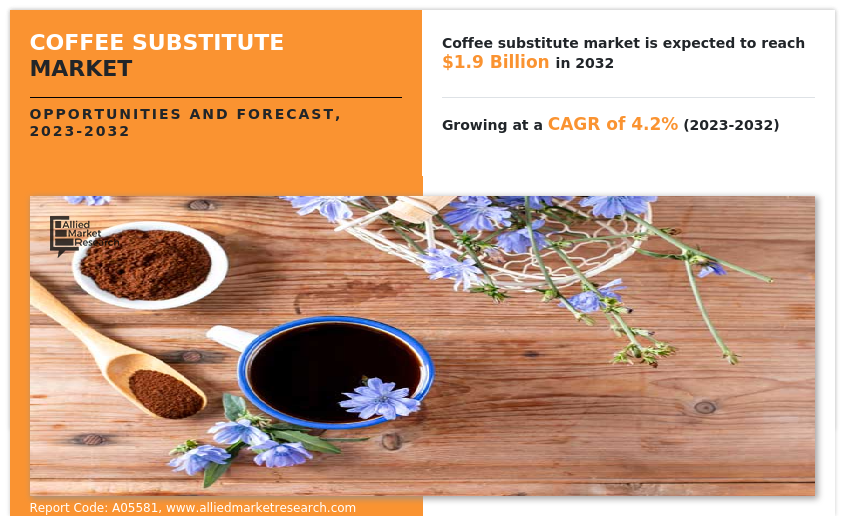
Rise in awareness regarding the health benefits of coffee substitutes has resulted from the shifting consumer preferences for beverages substitute and growing focus on healthier lifestyles. These coffee substitute products are characterized by their high fiber content and essential vitamins and minerals such as calcium, magnesium, potassium, and phosphorus, which are vital to promote wellness and provide consumers with nutritional requirements. There are many coffee substitutes that have diuretic and antioxidant properties, or unique characteristics based on their composition, which drives the market growth. The most frequently used ingredients in coffee substitutes such as chicory root and millet aid in digestion, whereas guarana provides energy and stimulation when consumed in proper amount. Moreover, numerous coffee substitutes are made from a blend of herbs, roots, and grains that offer potential health benefits. For instance, ingredients used in coffee substitutes such as dandelion root, chicory root, and roasted barley are widely known for their digestive and liver health properties, which helps to contribute nutritional value to consumers. In addition, certain coffee substitute components, such as roasted barley and chicory, possess antioxidants that may prevent oxidative stress and lower the risk of chronic illnesses. Moreover, these factors are expected to drive the growth of the coffee substitute market share in the coming years.
Furthermore, availability of coffee substitutes has gained extensive market coverage due to the growing internet reach and entry of various players offering a variety of coffee alternatives. Many market players have established online platforms for global product distribution, tapping into a vast customer base and driving market expansion.
High prices of coffee substitutes may pose a significant obstacle to the growth of the coffee substitute market during the forecast period. Some coffee substitutes, such as roasted chicory root or dandelion root, have limited cultivation and availability as compared to coffee beans. This limited supply is anticipated to increase the cost of these substitutes and directly impact the overall cost of the final product. It acts as a major barrier and may limit market penetration, especially among price-sensitive consumers who may not purchase it due to the perceived unaffordability of these products. Such pricing challenges may also reduce the competitiveness of coffee substitutes as compared to other alternatives in the market, potentially leading to a decline in market share. Moreover, high prices may contribute to the perception that coffee substitutes are niche or premium products rather than accessible alternatives to traditional coffee. This is further expected to hinder coffee substitute market growth efforts, particularly in emerging markets where affordability is a critical factor.
Rise in consumer demand for organic and sustainable coffee substitute products has presented a significant opportunity within the beverages industry, and has high potential to drive the demand for thsese products during the coffee substitute market forecast. Consumers prioritize eco-friendly options and healthier alternatives with rise in awareness of environmental condition and impact of several products on the ecosystem. Coffee substitute manufacturers are strategically sourcing certified organic ingredients, optimizing sustainable production processes, and emphasizing environmentally conscious packaging solutions. These certifications, such as USDA Organic and Fair Trade, serve as potent endorsements, as it assures customers of ethical sourcing and sustainable farming practices of coffee substitute products. Furthermore, coffee substitute brands has emphasized on this trend to enhance their market position by prioritizing their commitment to reduce environmental impact and promote well-being through caffeine-free and health-enhancing formulations in the coffee substitute category. Furthermore, introduction of organic, sustainable, and health-conscious attributes is reshaping the coffee substitute market and offers numerous growth opportunities and avenues for brand differentiation.
Segmental Overview
The coffee substitute market is segmented on the basis of product type, packaging, distribution channel, and region. By product type, the market is segregated into herbal coffee substitutes, grain-based coffee substitutes, and plant-based substitutes. As per packaging, it is bifurcated into pouches and cans. By distribution channel, the market is divided into hypermarkets/supermarkets, departmental stores, convenience stores, and online sales channels. Region-wise, it is analyzed across North America (U.S., Canada, and Mexico), Europe (UK, Germany, Spain, Russia, France, and rest of Europe), Asia-Pacific (China, India, Japan, Australia, South Korea, and rest of Asia-Pacific), and LAMEA (Brazil, Argentina, South Africa, and rest of LAMEA).
By Product Type
By product type, the herbal coffee substitute segment dominated the market, garnering a market share of 52.6% in 2022. The use of ingredients such as dandelion roots, chicory, roasted barley, carob, and cinnamon in coffee substitutes offers various health benefits, driving the growth of the herbal coffee substitute segment. Increase in consumer focus on health-conscious choices, caffeine sensitivity, and diverse flavor profiles has led to a higher demand for dandelion, chicory, and roasted grains coffee alternatives. These options are considered healthier owing to their caffeine-free nature and potential digestive benefits. In addition, their unique roasting processes provide a coffee-like experience without the use of coffee beans as it closely mimics the texture and flavor of coffee. With increase in efforts for sustainability, these substitutes, which are more adaptable to various climates and easily cultivated as compared to coffee beans, are preferred by eco-conscious consumers. Their allergen-free nature, suitability for specialized diets, and growing presence in specialty markets contribute to their rise in demand. Moreover, ethical considerations such as fair trade and environmental concerns in the coffee industry also drive consumers towards coffee substitutes. Furthermore, the increasing consumer shift towards healthier, sustainable, and diversified beverage options in the beverages market has significantly boosted the demand for dandelion, chicory, and roasted grains coffee substitutes.
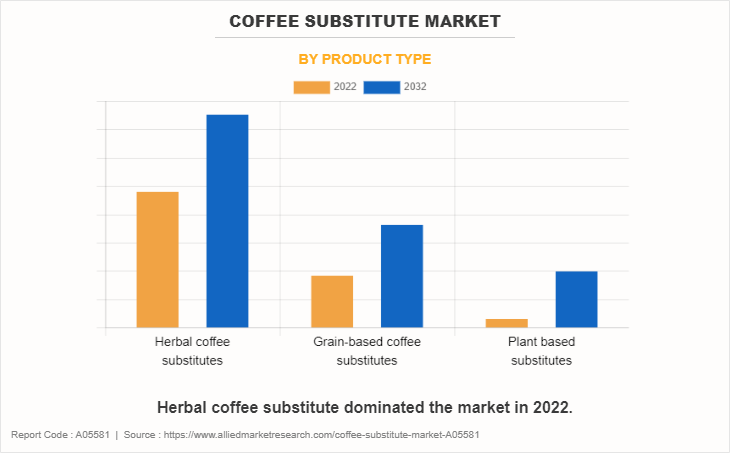
By Packaging
By packaging, the pouches segment dominated the market, garnering a market share of 85.5% in 2022. Pouch packaging in the coffee substitute market offers exceptional convenience and portability, which allow consumers to easily transport single-serving pouches for on-the-go coffee substitute preparation. The resealable feature of many pouches preserves product freshness, which ensures the flavor and aroma remain intact, as it is considered as a vital aspect of consumer satisfaction. Single-serving pouches meet the demand for quick and controlled servings, particularly valuable for individuals with busy lifestyles. Sustainability is an increasing concern, and eco-friendly pouch designs align with environmentally conscious consumers, driving demand for pouch packaging. Pouches also support a wide range of coffee substitute blends and encourages consumer experimentation and promote brand loyalty. Moreover, pouches enable innovative branding and cost-effective production, which minimizes product waste and benefits for both manufacturers and consumers. In addition, pouch packaging helps market players to align with market trends and ensures competitiveness within the dynamic coffee substitute industry. Thus, it helps to increase the coffee substitute market size.
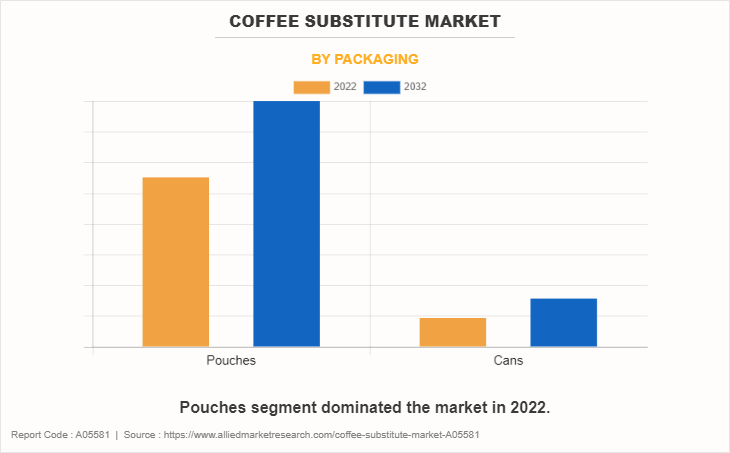
By Distibution Channel
By distribution channel, the hypermarket/supermarket segment dominated the market, garnering a market share of 35.1% in 2022. Hypermarkets and supermarkets serve as the primary retail channel for coffee substitutes, which offer an extensive array of products from various brands, each with distinct formulations and flavors. These products often feature ingredients such as chicory, dandelion roots, mushrooms, among others, providing consumers with a diverse range of selection in coffee substitute category. Availability of multiple coffee substitute brands and packaging options significantly boost the growth of hypermarkets and supermarkets. Moreover, supermarkets have gained popularity due to their convenience, as they provide a wide range of products under one roof and ample parking facilities with extended operating hours. Product arrangement strategies within supermarkets facilitate easy product comparison and streamlined purchasing decisions for consumers. In addition, competitive pricing and strategic locations make supermarkets an attractive shopping option for consumers. Properly trained staff further enhances the shopping experience by providing valuable product information, which significantly contributes to increased sales through this distribution channel. As a result, consumers are drawn to this segment, as it offers a one-stop destination for all their shopping needs, saving them valuable time and providing a platform for informed purchasing decisions.
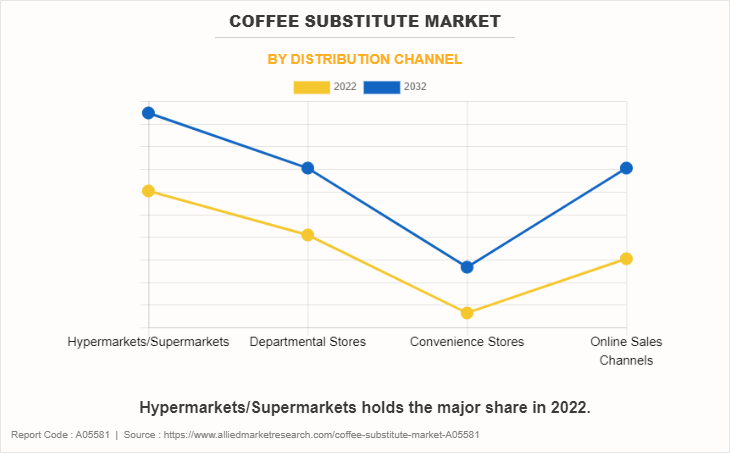
By Region
Region-wise, Europe dominated the market, garnering a market share of 37.6% in 2022. Coffee substitutes are rapidly gaining traction in European nations, as they align with the growing trend toward organic products and a shift away from chemically derived goods. This has led to increase in demand for coffee substitute products in the region. This growing demand in Europe is driven by shifting lifestyles, preference for convenient substitutes, and increased consumer interest in exploring new products. In addition, the strength of the market lies in the availability of diverse product flavors tailored to varying tastes and preferences, along with a wide range of packaging options and ingredients, making coffee substitutes a popular choice among consumers. Manufacturers in the coffee substitute segment are actively working on innovation to capture consumer interest and drive adoption, ultimately boosting demand in the Europe market. Europe experiences a high demand for coffee substitute products due to their distinct health benefits and a wide array of flavor options.
Furthermore, rise in consumer preference for organic substitutes over traditional coffee, coupled with dietary considerations, has made Europe an extensive market for organic coffee substitute products. Europe's prominent manufacturing industry is actively engaged in innovation, further accelerated by the COVID-19 pandemic, as individuals started shifting for beverages with added health benefits. Stakeholders in Europe are vigorously adopting new technologies and creating distinctive coffee substitute offerings, which reflects a transformative shift in the market landscape.
Asia-Pacific is expected to be the fastest growing region in the coffee substitute market during the forecast period. Consumers in the Asia-Pacific region increasingly prefer ethically sourced products, with a focus on both social and ecological considerations, which are highly found in coffee substitute products. The trend toward organic certification in the coffee substitute sector is gaining traction within Asia-Pacific consumer markets, especially in countries such as India and China. Most of the regional consumers believe that organically produced goods reduce exposure to synthetic chemicals and pesticides, driving the demand for certified organic coffee substitute products. The organic trend has become significant in the coffee substitute market, driven by rise in the number of individuals who recognize the benefits of the organic and sustainable approach. This trend is particularly fueled by a younger consumer demographic, eager to explore new unique products with varying taste profiles while maintaining awareness about the origin of the product. Major industry players are actively involved in producing such products to cater to consumer preferences and expand their product portfolios in the Asia-Pacific region. Furthermore, across the Asia-Pacific region, there is a growing awareness of health-conscious beverage choices, along with changes in meal patterns and dietary habits. These factors boost the sale of these products, which driving the coffee substitute market demand.
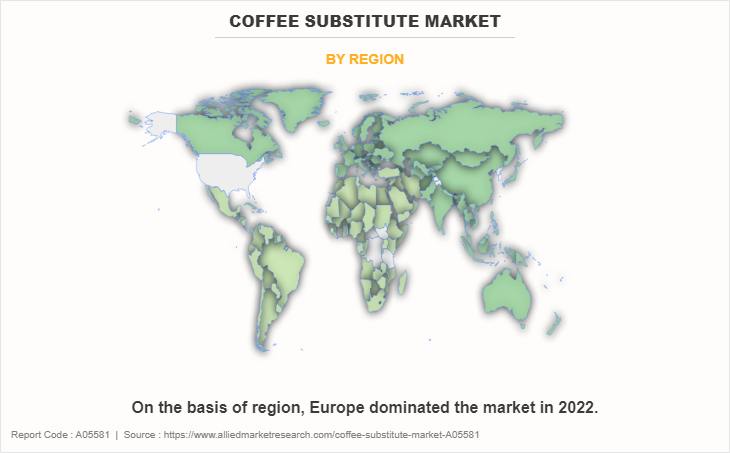
Competitive Landscape
Teeccino Caffe Inc., Rasa, Inc., Coffig for Life, LLC, Crio Bru LLC, Caf-Lib, MediDate, Tattva's Herbs LLC, Choffy Inc., Wooden Spoon Herbs, and Dandy Blend are the major companies profiled in the coffee substitute market report. These key players are constantly engaged in various developmental strategies such as product launches and business expansions to gain a competitive edge and exploit the prevailing coffee substitute market opportunities.
Recent Developments in the Market
Expansion in the Market
In August 2021, Dandy Blend launched a new brand design that includes updated logo, new website, and redesigned packaging to expand its business.
Product Launch in the Market
In January 2023, Rasa, Inc., launched two new coffee-alternatives namely, classic rasa and cafe rasa, with adaptogenic herbs and mushrooms to expand its offerings.
Key Benefits for Stakeholders
- This report provides a quantitative analysis of the market segments, current trends, estimations, and dynamics of the coffee substitute market analysis from 2022 to 2032 to identify the prevailing coffee substitute market opportunities.
- The market research is offered along with information related to key drivers, restraints, and opportunities.
- Porter's five forces analysis highlights the potency of buyers and suppliers to enable stakeholders make profit-oriented business decisions and strengthen their supplier-buyer network.
- In-depth analysis of the coffee substitute market segmentation assists to determine the prevailing market opportunities.
- Major countries in each region are mapped according to their revenue contribution to the global market.
- Market player positioning facilitates benchmarking and provides a clear understanding of the present position of the market players.
- The report includes the analysis of the regional as well as global coffee substitute market trends, key players, market segments, application areas, and market growth strategies.
Coffee Substitute Market Report Highlights
| Aspects | Details |
| Market Size By 2032 | USD 1.9 billion |
| Growth Rate | CAGR of 4.2% |
| Forecast period | 2022 - 2032 |
| Report Pages | 289 |
| By Product Type |
|
| By Packaging |
|
| By Distribution Channel |
|
| By Region |
|
| Key Market Players | Choffy Inc., Caf-Lib, Teeccino Caffe Inc., Rasa, Inc., Coffig for Life, LLC, Crio Bru LLC, Wooden Spoon Herbs, MediDate, Tattva's Herbs LLC, Dandy Blend |
Analyst Review
According to the CXOs, the coffee substitute market is poised for significant expansion in the coming years, driven by a shift in consumer preferences towards healthier, more sustainable, and diverse beverages categories. Strategic positioning of coffee substitutes aligns perfectly with this trend, offering an extensive range of innovative and cost-effective coffee substitutes. Top executives believe that there is a growing demand for coffee substitutes, particularly among the younger demographic, as this group exhibits concerns for health and the environment as compared to previous generations by actively seeking distinctive and flavorful coffee beverage alternatives. Thus, the development of unique, premium coffee substitutes by the use of high-quality ingredients is a priority for major key players operating in the market. Although the coffee substitute market is still in its early stages, it is undergoing rapid growth and continuous innovation, with a steady introduction of new products. The key players in the coffee substitute market are planning to keep pace with the swift evolution of the coffee substitute products by offering customers innovative and delicious choices with addition of functional ingredients that are beneficial for health and wellness.
Overall, the top CEOs are optimistic about the long-term growth of the coffee substitute market. The top executives in the coffee substitute industry have a positive outlook regarding its expansion potential. They identify several factors that drive this growth, which includes increasing consumer awareness of the health advantages linked to coffee substitutes, growth in demand for eco-friendly products, upsurge in trend of plant-based diets, and the expanding variety of coffee substitute options. Although the market encounters certain challenges, such as competition from the conventional coffee sector, limited consumer awareness, and the high price of specific coffee substitutes, executives are still to maintain a strong belief that the market will persist in its growth trajectory in the upcoming years.
The global coffee substitute market was valued at $1.3 billion in 2022, and is projected to reach $1.9 billion by 2032
The global Coffee Substitute market is projected to grow at a compound annual growth rate of 4.2% from 2023 to 2032 $1.9 billion by 2032
Teeccino Caffe Inc., Rasa, Inc., Coffig for Life, LLC, Crio Bru LLC, Caf-Lib, MediDate, Tattva's Herbs LLC, Choffy Inc., Wooden Spoon Herbs, and Dandy Blend are the major companies profiled in the coffee substitute market report. These key players are constantly engaged in various developmental strategies such as product launches and business expansions to gain a competitive edge and exploit the prevailing coffee substitute market opportunities.
Region-wise, Europe dominated the market, garnering a market share of 37.6% in 2022.
Rise in awareness regarding coffee substitute and its benefits, Addition of functional ingredients and introduction of various substitute, Growing availability of coffee substitutes
Loading Table Of Content...
Loading Research Methodology...



